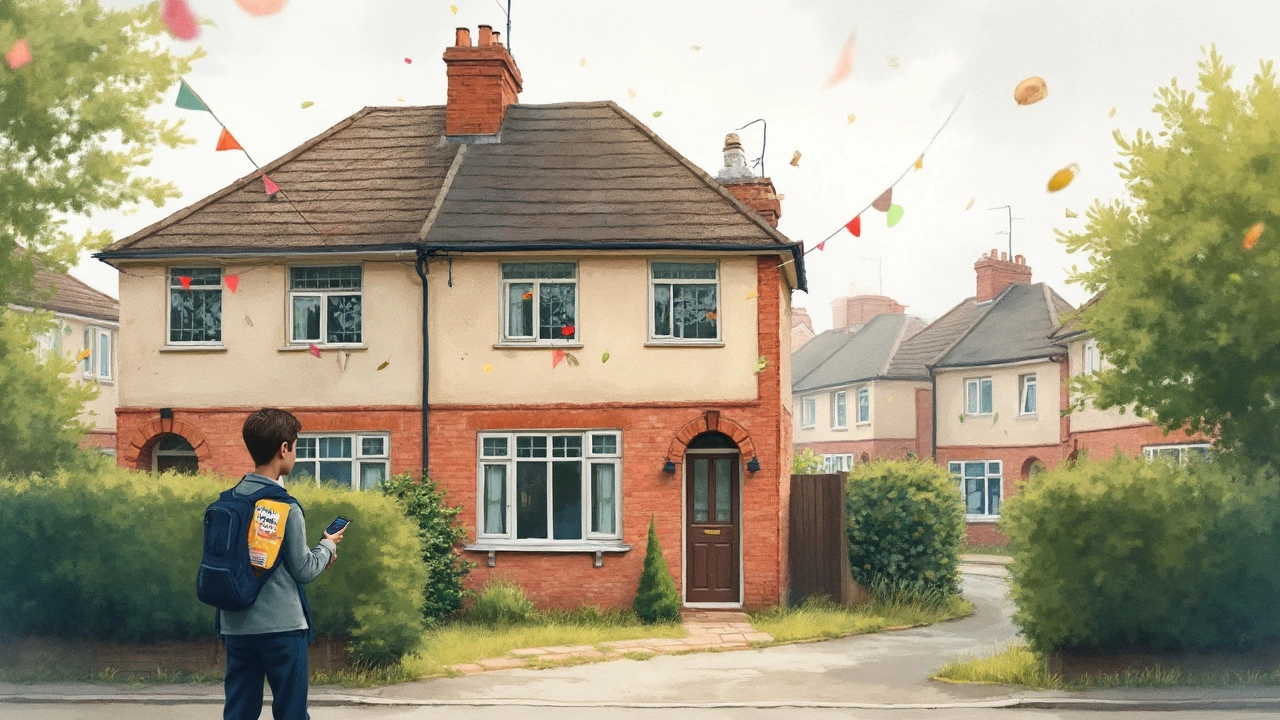Can I Buy a Home Making 30k a Year? Real Talk for First-Time Buyers
 May, 21 2025
May, 21 2025
Think you can’t buy a house on $30,000 a year? You’re not alone—even banks make that sound tough. But here’s a little secret: some folks are doing it. It just takes planning, real numbers, and a bit of hustle.
Start with the basics. Lenders look at your yearly income to size up what you can handle. They want to know your bills won’t bury you, so they check your debt-to-income ratio. If you’re working with $30k a year, you’ve got to get real about what sort of price tag you should even be looking at. Spoiler: it won’t be that glitzy condo downtown, but it might just be a solid starter home in an up-and-coming area or a fixer-upper you can slowly build into something better.
- What Does a $30k Salary Mean for Home Buying?
- Breaking Down the Numbers: How Much House Can You Afford?
- Mortgages and Programs That Can Help
- Tips to Improve Your Chances
- Is It Worth It? The Real Pros and Cons
What Does a $30k Salary Mean for Home Buying?
If your annual paycheck adds up to $30,000, you’ve probably realized the road to buying a home is a bit bumpier. Lenders care a lot about your income because it decides how much they think you can realistically pay back every month. The usual rule: all your home costs (including taxes and insurance) shouldn’t eat up more than 28-31% of your gross monthly income, but some programs let you go a little higher.
$30,000 a year breaks down to about $2,500 a month before taxes. After taxes, you’re looking at closer to $2,000 take-home. Here’s what that means when lenders crunch the numbers:
| Monthly Income (Gross) | Max Housing Costs (28%) | After Taxes (Est.) |
|---|---|---|
| $2,500 | $700 | $2,000 |
This $700 needs to cover the mortgage payment, property taxes, insurance, and maybe even HOA dues. If you have other monthly debts (like a car loan or credit cards), their payments get subtracted from your affordable housing budget, too.
Location changes everything. In big cities, $700 a month barely covers rent, let alone a mortgage. In smaller towns or rural spots, you might actually find a modest home in this ballpark. Most first-time buyers on a tight budget end up looking in areas where prices are much lower than the national average.
Bottom line: on $30k, the kind of home you can afford depends on costs in your area, how much debt you have, and how much you can scrape together for a down payment. If you’ve got a strong savings habit or a side hustle, you might be able to swing it. For everyone else, getting creative or using a buy a home on 30k strategy (like teaming up with a co-borrower or going for a fixer-upper) can help get your foot in the door.
- Know your debts—lenders count them all.
- Keep expectations realistic about price and location.
- Start tracking down neighborhoods with lower price tags.
Breaking Down the Numbers: How Much House Can You Afford?
If you’re making $30,000 a year, you’ve probably wondered just how far that paycheck can take you in the world of home buying. First off, lenders mainly look at your debt-to-income (DTI) ratio. This metric shows how much of your income goes toward debt each month. They generally want your total monthly debts—including your future mortgage—to stay below 36% of your gross income. For someone earning $30,000 a year, that means your total monthly debts should stay under $900.
Most financial experts say you shouldn't spend more than 28% of your monthly income on housing. Doing the math, that’s about $700 a month to cover your mortgage, taxes, and insurance. But let’s be real: with home prices where they are in 2025, $700 doesn’t stretch that far in most cities. That said, there are still places—small towns and rural areas—where it’s doable or at least within reach if you get creative.
Here’s what it could look like broken down by the numbers:
| Factor | Amount Based on $30k/Year |
|---|---|
| Max home price (with FHA loan, 3.5% down)* | $105,000 - $130,000 |
| Monthly payment target (including taxes/insurance) | $700 |
| Down payment needed (min 3.5%, FHA) | $3,675 - $4,550 |
*Assumes no major debts, average mortgage rates (about 6.8% in 2025), and very low property taxes.
Here’s what you should factor into your budget:
- Your current debts—student loans, car payments, credit cards?
- How much you’ve saved for a down payment. More is better, but FHA loans just need 3.5% down.
- The cost of taxes, insurance, and any possible PMI (private mortgage insurance)—they add up fast.
And here’s one thing to remember: just because a bank says you buy a home on 30k doesn’t mean you should stretch yourself thin. Always aim for a comfortable payment, not the biggest loan you can grab. A small house you own is a million times less stressful than a big one you’re always struggling to afford.

Mortgages and Programs That Can Help
If you’re making $30k a year, getting approved for a mortgage sounds like a stretch. But there are actually some programs out there that give people with lower incomes a fighting shot at buying a home. The trick? Picking the right one and showing lenders you can pay the bills—even if your paychecks aren’t huge.
buy a home on 30k usually means looking at loans with the lowest down payment requirements and flexible rules. These are the main options first-time buyers lean on:
- FHA Loans: The Federal Housing Administration lets you get a home with as little as 3.5% down. You don’t need perfect credit—scores as low as 580 qualify. Your monthly payment can’t be more than about 31% of your income, though, so you’ve got to keep your budget tight.
- USDA Loans: If you’re open to a rural area or a small town, the USDA loan is a lifesaver. You can put down nothing—literally $0 down—if you qualify. You can’t make more than a set amount per year, so you’d fit right in at $30k. But homes have to be in certain zones.
- VA Loans: Served in the military? VA loans offer $0 down and no private mortgage insurance (PMI). The rates are pretty low, too. Even if you haven’t served, keep this in mind for friends or family who might qualify.
- Local and State Programs: Many cities and states have programs just for first-time buyers. These can mean down payment help, grants, or even second loans with no payments due until you sell your home. Check your local housing finance agency to see what’s out there.
Here’s how those main options stack up:
| Loan Type | Minimum Down Payment | Credit Score Needed | Special Requirements |
|---|---|---|---|
| FHA Loan | 3.5% | 580+ | Primary residence only |
| USDA Loan | 0% | 640+ | Rural area; income limits |
| VA Loan | 0% | Typically 620+ | Military service |
| State/Local Programs | Varies | Varies | Check with local agency |
Down payments are the biggest roadblock for most folks. If you’re struggling to save, look for lenders or programs that count gift money from family or even side gig income. Sometimes community development credit unions or smaller local banks offer special loans for people with steady but lower pay. And don’t rule out manufactured homes—they’re often way cheaper and some lenders finance them.
Heads up: all these programs still want proof you can repay the loan. Having a steady income, keeping your debt low, and showing a year or two of solid job history all help your application look good. Start building credit if you’re not there yet, and keep an eye out for new programs—rules change, especially when housing costs go wild like they have lately.
Tips to Improve Your Chances
Landing a home on $30k a year means you've got to play your cards right. Every little boost counts, so here's what can make or break your shot at buying instead of renting for life.
- Work on Your Credit Score: Most lenders want to see a score of at least 620 for a basic conventional loan, but for FHA loans, you can squeak by with 580 or even lower—though you might have to cough up more for a down payment. So, pay your bills on time, cut out old debts, and check your reports for errors.
- Tighten Up Your Down Payment: Not everyone can slap down 20%. Thankfully, FHA loans let you in for as little as 3.5%, and some state programs, like those in Texas and Ohio, even offer down payment assistance for first-timers. That makes a big difference when you’re scraping by on a lower income.
- Find a Realistic Target Home Price: Use that 28% rule—don’t pay more than 28% of your monthly pre-tax income on housing. For $30k/year, that's about $700 a month for your mortgage, insurance, and taxes combined. This keeps you from getting in over your head.
- Minimize Debt: Credit cards, car payments, student loans—they all drag down your debt-to-income ratio, which is a huge deal for mortgage approval. Paying these down fast helps way more than you’d think.
- Look for Special Loan Programs: Dig into first-time homebuyer loans, USDA rural loans (yep, even in some suburban spots), or local grants. Sometimes, you’ll score reduced interest rates or even help with closing costs.
| Loan Type | Minimum Credit Score | Down Payment |
|---|---|---|
| Conventional | 620 | Usually 3%–20% |
| FHA | 580 (sometimes lower) | 3.5% and up |
| USDA | 640 | 0% |
| VA | No set minimum | 0% (for eligible veterans) |
If you need one takeaway here, it’s this: getting your debt and credit score in line should be the top thing on your to-do list if you want to buy a home on 30k. Combine that with hunting down loan programs, and you’ll be surprised at what you might qualify for.

Is It Worth It? The Real Pros and Cons
So you’re still wondering if buying a home when you make about $30,000 a year is really a smart move. Here’s the straight-up answer: it can be worth it, but the pros and cons stack up fast.
This isn’t just about pride of ownership. Let’s get into the benefits first:
- Stability: Homeowners aren’t at the mercy of rising rents or surprise evictions. You know where you’ll be next year.
- Forced savings: A mortgage is like a monthly savings plan—money builds up as equity, not just rent out the window.
- Personalization: No landlord to tell you what you can hang on the wall or if you can get that dog the kids want.
- Tax breaks: The IRS still lets most homeowners deduct mortgage interest and property taxes. That can shave down what you owe in April.
Now, for the reality check. The downsides are real, especially at this income:
- Unpredictable repairs: Roofs and furnaces don’t care how much you make. A busted water heater can wreck your budget in a single weekend.
- Less wiggle room: Most of your paycheck will disappear into the mortgage, insurance, and taxes. Saving up for emergencies gets tricky.
- Location limits: Your choices might be older homes or neighborhoods farther from city centers. Less walkability, more driving.
- Growth risk: If home values stall or your area dips, you might not gain much. Sometimes, renting and saving just feels safer.
To help you see the trade-offs, here’s what homeownership looks like on a $30k salary in 2024, using actual national averages:
| Average Monthly Expense | Estimated Cost |
|---|---|
| Mortgage (including taxes/insurance) | $700 |
| Utilities | $200 |
| Upkeep/Repairs | $120 |
| Food/Personal Costs | $600 |
| Car/Transportation | $250 |
| Left for Savings/Fun | $330 |
If your goal is to buy a home on 30k, you’ve really got to nail your budget, keep some cash on hand, and stay ready for a few curveballs. It’s doable, but it’s not stress-free. Think about what matters more: locking in your own place right now, or padding your savings and waiting for a bigger paycheck.